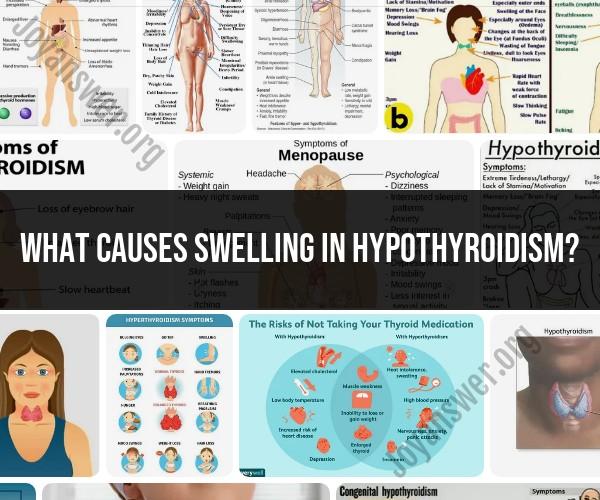What causes swelling in hypothyroidism?
Swelling in the neck area is a common symptom of hypothyroidism, a condition in which the thyroid gland does not produce enough thyroid hormones to meet the body's needs. The swelling in hypothyroidism is typically due to the enlargement of the thyroid gland, a condition known as "goiter." Here's why this happens:
Thyroid Hormone Production: The thyroid gland, located in the front of the neck, produces two main hormones: thyroxine (T4) and triiodothyronine (T3). These hormones play a crucial role in regulating the body's metabolism.
Feedback Mechanism: The production of thyroid hormones is controlled by a feedback mechanism involving the hypothalamus and the pituitary gland in the brain. When the levels of thyroid hormones in the bloodstream are low, the pituitary gland secretes thyroid-stimulating hormone (TSH) to stimulate the thyroid gland to produce more hormones.
Hypothyroidism: In hypothyroidism, the thyroid gland is not able to produce enough thyroid hormones, leading to low levels of T4 and T3 in the blood. As a result, the pituitary gland secretes more TSH in an attempt to stimulate the thyroid gland.
Goiter Formation: The increased production of TSH can lead to the enlargement of the thyroid gland (goiter) as it attempts to respond to the stimulation. This enlargement can cause noticeable swelling in the neck area, and it is often associated with a feeling of fullness or pressure in the throat.
The specific causes of hypothyroidism can vary. The most common cause worldwide is iodine deficiency, which is less common in regions with sufficient dietary iodine intake. Other causes include autoimmune thyroiditis (Hashimoto's disease), certain medications, radiation therapy to the neck, surgical removal of part or all of the thyroid gland, and congenital thyroid disorders.
It's important to note that while goiter is a common sign of hypothyroidism, not everyone with hypothyroidism will develop noticeable swelling in the neck. Some individuals may have hypothyroidism without obvious physical signs but may experience other symptoms such as fatigue, weight gain, cold intolerance, and dry skin. If you suspect you have hypothyroidism or experience any concerning symptoms, it's advisable to consult a healthcare professional for evaluation and appropriate management.
Unpacking Hypothyroidism: Swelling and Its Causes
Hypothyroidism is a condition in which the thyroid gland does not produce enough thyroid hormones. Thyroid hormones are essential for many bodily functions, including metabolism, growth, and development.
Swelling, also known as edema, is a common symptom of hypothyroidism. It can occur in the face, hands, feet, and ankles. Swelling is caused by fluid retention, which is the accumulation of excess fluid in the tissues of the body.
There are a number of causes of swelling in hypothyroidism, including:
- Reduced production of thyroid hormones: Thyroid hormones help to regulate the balance of fluids in the body. When thyroid hormone levels are low, the body may retain more fluid.
- Increased vascular permeability: Thyroid hormones help to maintain the integrity of the blood vessels. When thyroid hormone levels are low, the blood vessels may become more permeable, allowing fluid to leak into the tissues.
- Reduced production of albumin: Albumin is a protein that helps to keep fluid in the blood vessels. When thyroid hormone levels are low, the body may produce less albumin, which can lead to fluid retention.
Thyroid Disorders and Swelling: The Link to Hypothyroidism
Swelling can also be a symptom of other thyroid disorders, such as hyperthyroidism (overactive thyroid) and thyroiditis (inflammation of the thyroid gland). However, hypothyroidism is the most common thyroid disorder associated with swelling.
Swelling in Hypothyroidism: How Thyroid Hormones Impact Fluid Retention
Thyroid hormones help to regulate the balance of fluids in the body in a number of ways. First, thyroid hormones help to maintain the integrity of the blood vessels. This prevents fluid from leaking into the tissues.
Second, thyroid hormones help to regulate the production of albumin. Albumin is a protein that helps to keep fluid in the blood vessels. When thyroid hormone levels are low, the body may produce less albumin, which can lead to fluid retention.
Finally, thyroid hormones help to regulate the sodium-potassium pump. The sodium-potassium pump is a mechanism that helps to maintain the balance of sodium and potassium in the cells. When thyroid hormone levels are low, the sodium-potassium pump may not work as effectively, which can lead to fluid retention.
Conclusion
Swelling is a common symptom of hypothyroidism. It is caused by fluid retention, which is the accumulation of excess fluid in the tissues of the body. There are a number of reasons why hypothyroidism can cause swelling, including reduced production of thyroid hormones, increased vascular permeability, and reduced production of albumin.
If you are experiencing swelling, it is important to see a doctor to determine the underlying cause. If you are diagnosed with hypothyroidism, your doctor will work with you to develop a treatment plan to manage your condition and reduce your symptoms.











